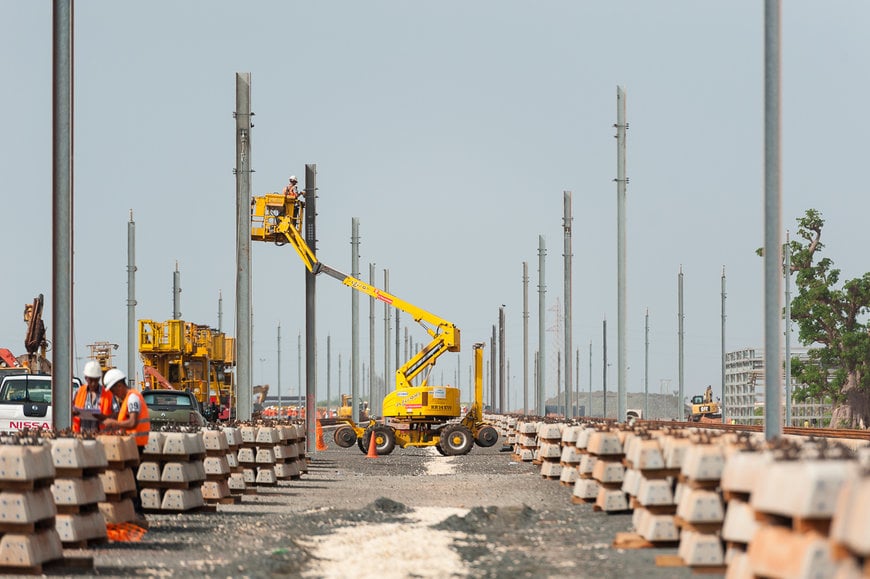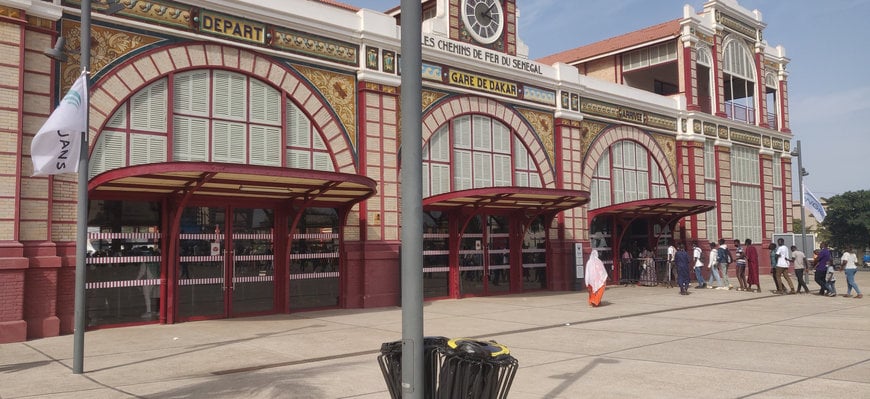railway-international.com
04
'22
Written on Modified on
TER Dakar: a whole range of expertise and technologies to revive Senegal's rail transport system
After a project lasting five years, Dakar's regional rail link (Train Express Régional – TER) has just been inaugurated and brought into operation. Led by EQUANS and Thales, the consortium behind the project drew on a range of innovative solutions and smart systems to support Senegal in its transition to more virtuous modes of transport that offer higher economic, societal and environmental performance. The next stage in the programme is the construction of the second section of the TER to extend the line to the Blaise Diagne international airport.

Explanations by Thibaut Catimel, project lead at EQUANS France, and Nene Gassama-Cisse, in charge of the technical solution for Thales.
What type of expertise did EQUANS bring to this new rail line project?
Thibaut Catimel – The teams from INEO, an EQUANS entity, worked hand in hand with all the companies involved in the project, and in particular with Thales, its partner in the consortium for which EQUANS is lead contractor. We were involved at every stage of the rail link project, from design to construction and system integration testing. In practical terms, that included providing the electrical power supplies for the rail infrastructure (traction and systems) and for the buildings and stations. We also developed the GSM-R system for track-to-train communications, the SCADA system for real-time supervisory control and data acquisition, the videosurveillance, telephone, fire safety and access control systems, the multi-service network and Wi-Fi solutions for the stations and trains. Many users do not realise how many different technologies go into a train line project, but as you can see, we have been providing a whole range of crucial expertise on this unprecedented project since 2016 to ensure the safety and performance of the transport system.
What about Thales?
Nene Gassama-Cisse – We worked closely with EQUANS to provide overall project management, organise design work and conduct system integration testing. Thales brought to the table its world-class expertise in rail signalling and security, providing a latest-generation signalling system comprising PIPC electronic interlockings, a European Train Control System (ETCS) Level 2 system to ensure train control and safety without relying on trackside equipment, electronic axle counters and the centralised traffic control (CTC) centre. Thales also provided a communication network and a real-time passenger information system that automatically displays train information and broadcasts audio messages in stations and depots and on platforms.
Last but not least, Thales supplied a complete, latest-generation revenue collection system with modern access gates including QR code and contactless card readers, ticket counter equipment and ticket vending machines accommodating mobile payments, which are very popular in Senegal, as well as an online ticket sales solution. Users will be able to use their smartphones to do everything from paying for their fares to presenting their QR codes at the gate to board the train.
What were the main challenges you faced on this unprecedented project?
Thibaut Catimel – The first section of the line between downtown Dakar and Diamniadio follows the route of a former metre-gauge railway, which had a narrower track gauge than the current standard. We needed to replace this obsolete infrastructure and install a signalling system with electronic interlockings. One of the first challenges was to gain access to the areas around the existing railway line, which raised a number of land use and other issues. The work performed by EQUANS started with the electrical substation at Mbao, whose foundations needed to be raised because it is located in an area subject to flooding. Building the rail link itself was also a major undertaking: our teams had to install 2,300 catenary poles and the cable routing, which accommodates all the wires and cables used by the rail system, including the signalling system and the multi-service fibre-optic network.
We also built nine new structures to house the signalling systems, erected seven GSM-R masts and created three new electrical stations to power the catenary. We received valuable support from our local partner, the Senegalese company CSE, at key stages in the project. After meeting one final challenge – organising and conducting integration testing on all the rail systems in record time – the TER is now ready for its users! Its 13 stations, including the historic Dakar and Rufisque stations, which have also been renovated, now provide suburban communities in the Senegalese capital with easy access to a modern transport infrastructure. During the construction work, local residents were well aware of the scale of the project, which is the largest of its kind ever conducted in Senegal, and can't wait to use the new rail link! EQUANS has been supporting the energy and digital transition in Africa for 50 years, and was involved in designing and installing all the systems, from lighting to IT and communications, needed to operate and maintain the different sites.

Nene Gassama-Cisse – TER Dakar presented multiple challenges for Thales. First, we had to organise and manage a large-scale project involving several of our international entities, with the project management office located in Senegal, the interlockings team in France, ETCS Level 2 and centralised traffic control in Spain, the passenger information system in Portugal and the fare collection system in France and Italy. So we had to ensure consistency and continuity between all the different players inside the Thales organisation, but also with the teams in charge of other parts of the project (rolling stock, building construction, systems used by road transport operators, etc.). We needed to design and implement a complex solution to meet the exact needs of the customer and the future rail operator. The overall system is made up of several complex subsystems as well as critical software for multiple safety and security applications, and needed to be integrated ahead of time on Thales's integration platforms.
Then we needed to run site tests incrementally to adjust the systems to the physical configuration of each station and each section of track, taking into account a highly specific local context and the constant need to guarantee the safety of everybody working on-site and engaged in other activities in the vicinity. The Dakar regional express train link is the first rail transport project of its kind in Senegal. Thales has set up several training platforms for local staff to ensure Senegal's autonomy and provide future opportunities for young Senegalese talent. With our partner EQUANS, we needed to be extremely agile in our working methods, especially in the midst of a public health crisis. This project has been an amazing human adventure with innumerable players, companies and countries working collectively to meet the needs of our Senegalese customer APIX.
In short, a full understanding of complex transport systems and the specific constraints of each project is the key to the successful management and completion of this type of modern, large- scale undertaking. Thales's expertise in this area has been crucial to the success of the TER Dakar project. Our experts are working in some 50 countries, where we are the market leader in rail signalling for metros, regional train links and high-speed lines, as well as integrated supervision, communication, passenger information and fare collection systems. This has been the case for more than 30 years in Africa, not only in Senegal but also in Algeria, Morocco, Egypt, Nigeria and South Africa.
www.thalesgroup.com

